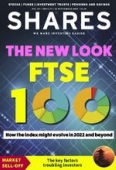Archived article
Please note that tax, investment, pension and ISA rules can change and the information and any views contained in this article may now be inaccurate.
Want Asia exposure but worried about China? Try Vietnam

As Chinese markets continues their collapse, driven initially by the heavy-handed treatment of technology stocks by the authorities and more recently by a collapse in over-leveraged property stocks, investors seeking for better alternatives in Asia should look at Vietnam. VinaCapital Vietnam Opportunities Fund (VOF) is a good way to invest in the market.
Previously regarded as a ‘frontier’ market, Vietnam has recently been upgraded to emerging status by MSCI as it treads the same well-worn path to prosperity as other Asian countries like Taiwan and South Korea.
Thanks to the pace of technological change, the transformation of Vietnam from frontier to emerging and ultimately developed market is likely to be much quicker.
Half of the population of 97 million people is under 35 years of age, and as this cohort joins the expanding middle class over the next five to 10 years the potential for economic growth is vast. The country has attracted strong direct investment from companies in China and around Asia as well as from the US and Europe.
According to the World Bank the economy is expected to grow by 4.8% this year, although this is two percentage points lower than originally estimated as government measures to contain Covid have hit consumer spending.
While vaccinations have been accelerated, Vietnam has the strictest lockdown measures in South East Asia with all non-essential businesses shut in the capital Ho Chi Min City.
This pause in growth, and in the sharp rise of the Vietnamese market since March last year, is an opportunity for investors to get on board before the next leg up in 2022 when the economy is expected to resume its pre-pandemic growth rate of 7%.
VinaCapital Vietnam Opportunities Fund mainly invests in companies which are geared to domestic growth and the rise of the middle class, for example property companies and consumer goods producers.
As well as quoted stocks, the fund is plugged into unlisted companies and private equity opportunities. It has benefited from the move from private to public in various holdings, creating substantial gains. Shareholders are also getting dividends, with a 2.1% historic yield.
Despite generating more than double the returns of the MSCI index over the last five years, the shares are trading at a discount of more than 20% to their net asset value, which is more a reflection of investor nervousness towards Asia and emerging markets in general rather than a judgement on Vietnam or the fund.
The ongoing charge is 1.72%, higher than most global funds and reflecting its specialist skills in finding opportunities in the country.
Important information:
These articles are provided by Shares magazine which is published by AJ Bell Media, a part of AJ Bell. Shares is not written by AJ Bell.
Shares is provided for your general information and use and is not a personal recommendation to invest. It is not intended to be relied upon by you in making or not making any investment decisions. The investments referred to in these articles will not be suitable for all investors. If in doubt please seek appropriate independent financial advice.
Investors acting on the information in these articles do so at their own risk and AJ Bell Media and its staff do not accept liability for losses suffered by investors as a result of their investment decisions.
Issue contents
Editor's View
Feature
Great Ideas
- China exposure is a key risk for Lindsell Train Equity Fund
- Alliance Pharma's growth potential remains underappreciated
- Why this Japanese trust has gained 15% in a month
- Close to 50% gain from Equals since April, more to come?
- Want Asia exposure but worried about China? Try Vietnam
- A brighter outlook for property makes this 5% yielding trust a bargain
 magazine
magazine








